
Victory in Europe Day is the day celebrating the formal acceptance by the Allies of World War II of Germany's unconditional surrender of its armed forces on Tuesday, 8 May 1945; it marked the official end of World War II in Europe in the Eastern Front, with the last known shots fired on 11 May.

Victory Day is a holiday that commemorates the Soviet Union victory over Nazi Germany in 1945. It was first inaugurated in the 15 republics of the Soviet Union following the signing of the German Instrument of Surrender late in the evening on 8 May 1945. The Soviet government announced the victory early on 9 May after the signing ceremony in Berlin. Although the official inauguration occurred in 1945, the holiday became a non-labor day only in 1965.

Victory over Japan Day is the day on which Imperial Japan surrendered in World War II, in effect bringing the war to an end. The term has been applied to both of the days on which the initial announcement of Japan's surrender was made – 15 August 1945, in Japan, and because of time zone differences, 14 August 1945 – as well as to 2 September 1945, when the surrender document was signed, officially ending World War II.
This is a list of public holidays in North Korea. See also the Korean calendar for a list of traditional holidays. As of 2017, the North Korean calendar has 71 official public holidays, including Sundays. In the past, North Koreans relied on rations provided by the state on public holidays for feasts. Recently, with marketization people are able to save up money and buy the goods they need.

A military parade is a formation of soldiers whose movement is restricted by close-order manoeuvering known as drilling or marching. Large military parades are today held on major holidays and military events around the world. Massed parades may also hold a role for propaganda purposes, being used to exhibit the apparent military strength of a country.
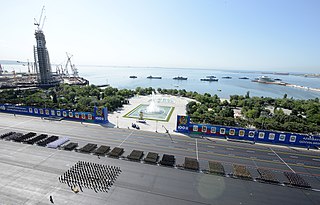
An Armed Forces Day, alongside its branch-specific variants often referred to as Army or Soldier's Day, Navy or Sailor's Day, and Air Force or Aviator's Day, is a holiday dedicated to honoring the armed forces, or one of their branches, of a sovereign state, including their personnel, history, achievements, and perceived sacrifices. It's often patriotic or nationalistic in nature, carrying propaganda value outside of the conventional boundaries of a military's subculture and into the wider civilian society. Many nations around the world observe this day. It is usually distinct from a Veterans or Memorial Day.

The Down-with-Imperialism Union was allegedly founded on 17 October 1926 in Hwatian County, Kirin, China, in order to fight against Japanese imperialism and to promote Marxism–Leninism. It is considered by the Workers' Party of Korea to be its root and foundation and its creation is celebrated every year.
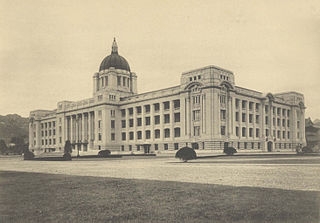
The Government-General of Chōsen Building, also known as the Japanese General Government Building and the Seoul Capitol, was a building located in Jongno District of Seoul, South Korea, from 1926 to 1996.

Pak Song-chol or Park Sung-chul was a North Korean politician who served as Premier of North Korea from 1976 to 1977. He succeeded Kim Il. He also served as foreign minister from 1959 to 1970.

The Arch of Reunification, officially the Monument to the Three-Point Charter for National Reunification, was a sculptural arch located south of Pyongyang, the capital of North Korea. It was opened in August 2001 to commemorate Korean reunification proposals put forward by Kim Il Sung. Made of concrete, the arch straddled the multi-laned Reunification Highway leading from Pyongyang to the Korean Demilitarized Zone. The arch appeared on postage stamps issued in 2002, 2015, 2016, and 2021. The monument was demolished in January 2024.

Time in North Korea, called Pyongyang Time or Standard Time of the Democratic People's Republic of Korea, is since May 2018 equal to Korea Standard Time: 9 hours ahead of UTC (UTC+09:00). Like South Korea, North Korea does not currently observe daylight saving time. Time keeping in North Korea is under the State Commission for Science and Technology.
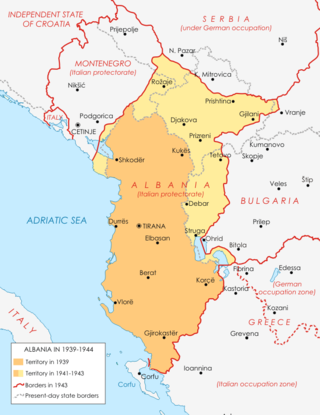
Liberation Day in Albania is commemorated as the day, November 29, 1944, in which the country was liberated from Nazi Germany forces by the Albanian resistance during World War II.
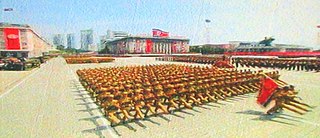
The Day of Victory in the Great Fatherland Liberation War is a national holiday in North Korea celebrated on July 27 to mark the signing of the Korean Armistice Agreement which brought a cease fire to the Fatherland Liberation War that took place in 1950–53; it is referred to as "Victory Day" despite the fact that the war is generally regarded as having ended in a stalemate. On this day ceremonies are held at the Victorious Fatherland Liberation War Memorial.
Student Day is the anniversary of the Student Independence Movement against the Japanese rule of Korea. It occurred in 1929, in the city of Gwangju.

The Day of the Sun is an annual public holiday in North Korea on 15 April, the birth anniversary of Kim Il Sung, founder and Eternal President of North Korea. It is the most important national holiday in the country, and is considered to be the North Korean equivalent of Christmas. Kim's birthday, which had been an official holiday since 1968, was renamed Day of the Sun in 1997, three years after his death. The name takes its significance from his name: Il-sung.
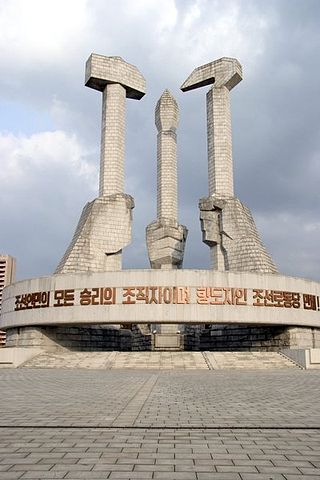
The Party Foundation Day is an annual public holiday in North Korea marking the 10 October 1945 foundation of the "Central Organizing Committee of the Communist Party of North Korea", known as the "North Korea Bureau of the Communist Party of Korea" in the West and considered a predecessor to the ruling Workers' Party of Korea.

The Day of the Shining Star is a public holiday in North Korea falling on 16 February, the anniversary of the birth of the country's second leader, Kim Jong Il. Along with the Day of the Sun, the birthday of his father Kim Il Sung, it is the most important public holiday in the country.

Military Foundation Day(Korean: 조선인민군 창건일) is an annual public holiday in North Korea falling on 8 February.

This is a list of military parades held in Pyongyang, the capital of the Democratic People's Republic of Korea (DPRK) since 1948. All military parades consist of troops from the Korean People's Army and the paramilitary Worker-Peasant Red Guards. All military parades of a national nature are held on Pyongyang's Kim Il-sung Square with the General Secretary of the Workers' Party of Korea, President of the State Affairs Commission and Commander-in-Chief of the Armed Forces of North Korea in attendance. These parades are broadcast live on Korean Central Television.
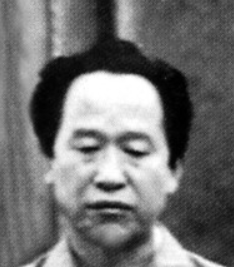
Kim Jung-rin (Korean: 김중린) was a North Korean politician who was an alternate member of the Politburo of the Central Committee of the Workers’ Party of Korea, as well as a member of the Politburo and party secretary.




















